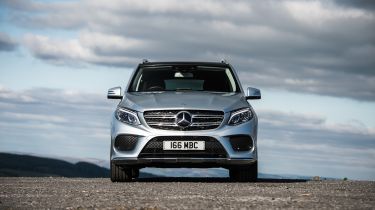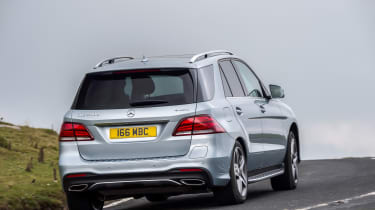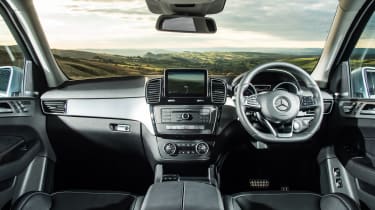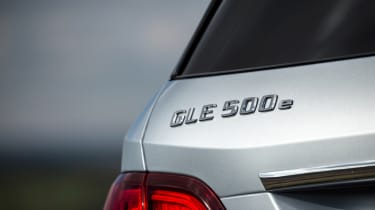Mercedes GLE 500e plug-in hybrid (2015-2018)
“Only company-car users stand to save much money with the Mercedes GLE 500e, but its impressive power will appeal private buyers, too”
Pros
- Very fast
- Desirable image
- Low company-car tax
Cons
- Firm ride
- Becoming dated
- Expensive to run
The Mercedes GLE SUV corresponds roughly with the Mercedes E-Class in the German company’s hierarchy. It competes against the BMW X5, Audi Q5 and Volvo XC90, although upper models in the range run far beyond the price points of rivals.
The plug-in hybrid GLE 500e is the only petrol-powered model in the range to go without Mercedes-AMG badging and uses a 3.0-litre V6 engine, rather than the 5.0-litre that Mercedes naming convention suggests. This produces 328bhp and is assisted by a 114bhp electric motor – enough power when combined to allow 0-62mph in just 5.3 seconds. The only GLE that’s quicker is the extreme Mercedes-AMG GLE 63 – an SUV that couldn’t be more different in its mission statement.
Low exhaust emissions are the main point of plug-in hybrid cars, and the 500e’s 78g/km CO2 figure is by far the lowest in the GLE range. This means far a more attractive Benefit-in-Kind (BiK) company-car tax rate than even the entry-level diesel model. If you’re in a position to take advantage of this, the GLE 500e makes a sound choice.
Its case for private buyers isn’t quite so clear-cut. If your daily commute is in urban traffic and is shorter than the GLE’s claimed all-electric range of 18.6 miles, you can enjoy petrol-free zero-emissions motoring, but once you leave the city limits you’re likely to see fuel economy far more in line with a typical 3.0-litre petrol engine in a heavy SUV. If you make regular long motorway journeys, a GLE diesel will be far more cost-effective.
More reviews
However, the plug-in hybrid’s rorty performance is a definite attraction – it’s nearly as quick as the range-topping AMG 63 and a whole lot more subtle to look at or to listen to. Like any other GLE, it offers spacious accommodation for five and a big boot, but you’ll need to consider the larger Mercedes GLS if you want a seven-seat Mercedes SUV – while the X5 and XC90 both offer a seven-seat option.
Mercedes has always been regarded as a ‘premium’ brand in the UK and the GLE has an upmarket, high-quality image. Owner satisfaction isn’t always assured, though, and running costs can be high – even if you make a fuel saving in all-electric mode. However, the GLE is a popular and respected luxury SUV, and one for which used values are strong.
MPG, running costs & CO2
As a large, heavy SUV, the Mercedes GLE is an expensive car to run. But if you’re a company-car user, and your allowance will accommodate the GLE 500e’s high asking price, it could save you hundreds of pounds in tax compared to a regular petrol or diesel model.
The fact that the GLE can be driven in all-electric mode – albeit for only a claimed 18.6 miles – brings its CO2 emissions figure down in official measurements. If 21-inch wheels are fitted, it emits 78g/km of CO2, translating to a 17% Benefit-in-Kind (BiK) company-car tax liability. This compares to 33% for the entry-level 250d diesel and 37% for either of the pure petrol versions.
Although the taxable (P11D) value that company-car tax is based on is over £10,000 higher for the 500e plug-in hybrid than the 250d, the difference in BiK means you could be several thousand pounds better off every year with the former. Unfortunately, its CO2 output is slightly too high for any government plug-in vehicle grant to apply.
The biggest saving a private owner can expect is on petrol, but this saving will only be enjoyed by those who do much of their driving in urban areas where the 500e’s electric motor is most likely to come into play.
The 500e’s claimed fuel consumption is 76.4mpg and if your commute is on slow, congested roads and you travel less than 18 miles a day, it’s quite possible that you can avoid using petrol at all. However, in faster traffic, or on longer journeys, the petrol engine will rarely be off, so you can expect economy more akin to any bulky SUV with a 3.0-litre petrol engine.
In other regards, a GLE 500e will be similarly costly to maintain as any other GLE, with consumable items such as tyres and brakes more expensive than on a smaller, lighter car. Mercedes does offer service plans, though, which can help you to spread the cost of routine maintenance. Mercedes provides a three-year/unlimited-mileage warranty and the high-voltage battery is covered by a separate six-year/62,500-mile warranty.
Since the GLE’s list price exceeds £40,000, you can expect a bill of £440 the first five times you renew its road tax – this includes a £10 yearly discount for hybrid and ‘alternative fuel’ cars and reverts to £130 a year after the fifth year.
Engines, drive & performance
If you don’t stand to make much of a saving on the GLE 500e’s running costs compared to a diesel version, you can at least enjoy the plug-in hybrid’s electrically boosted performance. The main engine is a 3.0-litre V6 petrol that produces 328bhp and the electric motor contributes another 113bhp. This is enough to take you to a claimed 80mph alone – although doing so will rapidly deplete the 18.6-mile range Mercedes claims in electric mode.
You can use both motors together to increase acceleration, too – so this heavy SUV can be launched from 0-62mph in a sports-car-troubling 5.3 seconds. Of the whole GLE range, only the blisteringly quick Mercedes-AMG GLE 63 S can beat that. Top speed is 152mph, where it’s safe and legal to do so.
The 3.0-litre V6 engine makes a muted but appealing noise under full acceleration and is very quiet at cruising speeds. Trickling along slowly in urban traffic is almost silent, of course. You can choose the Mercedes AIRMATIC air-suspension system, which incorporates adaptive damping to reduce body lean – and it does quite a good job.
There’s a ‘dynamic select’ system with a choice of driving modes: sports mode tightens the steering, sharpens the response of the accelerator and gearbox and stiffens the suspension when AIRMATIC is fitted. But even with this engaged, you’re all too aware of the GLE’s imposing bulk and weight. It can prove a frustrating car to drive enthusiastically and you’ll probably prefer driving a little more calmly in comfort mode. However, the ride remains quite firm even with that engaged and the shock of road potholes is exacerbated when 21-inch alloy wheels are fitted.
Interior & comfort
The Mercedes GLE’s interior is generally very well assembled and high-quality materials are used. However, a blocky look clearly betrays its age, particularly when more recent models in the Mercedes range share a more sophisticated style inspired by the flagship Mercedes S-Class saloon.
There’s no shortage of standard kit, though, as you might expect with such an expensive car. All models feature Mercedes’ COMAND online infotainment system with sat nav, Bluetooth phone connectivity and online features, a reversing camera and DAB radio. There’s privacy glass, a powered remote-control tailgate, keyless go and LED headlamps, while a light source built into each mirror projects the Mercedes-Benz logo on the ground when you enter or exit.
On top of all this standard equipment, you can pick two specification levels for the 500e plug-in hybrid: AMG Line and Designo Line. There’s over £9,000 between the two and many will be happy with the AMG Line, with its AMG styling package and 20-inch wheels. You also get the AIRMATIC suspension system and sports brakes with Mercedes-Benz lettering.
Designo Line adds a Designo interior package with quilted Nappa leather and matching high-gloss poplar wood trim, a panoramic sunroof, heated and cooled multi-contour front seats with a massage function, heated rear seats, three-zone climate control air conditioning and a Harmon Kardon surround sound system.
Practicality & boot space
As its looks suggest, the GLE 500e offers plenty of upright space for five adults to sit in relative luxury. The GLE doesn’t feel as high off the ground as some SUVs and most will find climbing in fairly easy. Access to the rear seats is made a little tricky by the large rear wheelarches, though.
Inside, the driver will quickly find a comfortable driving position thanks to power-adjustable seats with a memory feature that includes the position of the steering wheel. The windscreen pillars are fairly narrow for a good view forwards, but the privacy glass and rear head restraints mean rear visibility is rather restricted.
Models with black leather can feel a little gloomy inside unless a panoramic sunroof is fitted, and when it’s specified it doesn’t eat into headroom too badly. Some newer rivals have more rear-seat legroom, but most adults will still be content. Three adults can happily sit abreast of one another, too, though a seven-seat option isn’t available – the larger Mercedes GLS is the only seven-seater SUV from the marque.
There’s a helpful selection of interior storage solutions to hand – the glovebox is huge and will hold a large water bottle and there are cubbies scattered throughout the interior. You can also add heated and cooled cup-holders as an optional extra.
The boot is a good shape and is made easier to use by its electric remote control tailgate. However, the plug-in hybrid system’s battery pack eats into luggage space and the GLE can only offer 480 litres compared to the 690 litres of other models. Folding the rear seatbacks means you can increase load space at the expense of passenger capacity, but Mercedes doesn’t publish a capacity figure for the 500e.
The good news, though, is that Mercedes does publish towing weights for the 500e, while many plug-in hybrid models aren’t recommended for towing. The Mercedes can safely tow a 750kg unbraked trailer and a braked trailer of up to 2,000kg. Some other GLE models can haul a 3,500kg braked trailer, though.
Reliability & safety
Although Mercedes has a reputation for quality, owners aren’t always as complimentary about their cars as you might expect. In our 2017 Driver Power owner satisfaction survey, the brand came 21st overall out of 27 brands covered.
Although too few GLE owners participated for it to be individually scored, it’s still worth looking at the brand’s overall result. Owners were disappointed by the high running costs of their cars, voting the brand into 24th place in this respect – although this is influenced by the high insurance costs of many models. Driver involvement wasn’t praised, either, with Mercedes languishing in 22nd place here.
Reliability was ranked a little more positively – owners voted the brand into 16th place here, despite 15.2% reporting one or more faults during the first year of ownership.
When it comes to safety, the GLE doesn’t have a Euro NCAP crash-test rating, but – name aside – it’s the same car as the Mercedes ML, which was given a five-star safety rating back in 2012. Testing regimes have become stricter since then, though, but the GLE’s safety equipment roster has lengthened, too.
Unlike newer rivals, and more recent cars in the Mercedes range, the GLE doesn’t offer autonomous emergency braking, although active lane-keeping assistance, active cruise control and blind-spot monitoring are available as part of a Driving Assistance Plus package.
Price, value for money & options
There are several plug-in hybrid SUVs out there to tempt you away from the Mercedes GLE 500e and countless other non-plug-in hybrids, too. However, its most direct rivals are the BMW X5 xDrive40e SE plug-in hybrid, the Volvo XC90 T8 Twin Engine and the Audi Q7 e-tron.
The Audi is similarly expensive as the Mercedes, but is a slightly larger car with increased interior space – although it doesn’t offer seven seats like other Q7s. The Volvo XC90 is one of our favourite large SUVs and is significantly less expensive to buy. It’s also the only seven-seat plug-in hybrid SUV you can buy and comes with one of the most appealing interiors available at any price.
The driver’s choice is undoubtedly the BMW X5 xDrive40e. Although its petrol engine is smaller than the Mercedes at 2.0-litre, this makes it lighter and the X5 is the most responsive of the bunch to drive – although all are bound by the limits their size and bulk impose. Its small engine also makes it the cheapest of all the premium plug-in hybrid SUVs.
If you choose the Mercedes and want to make it more to your liking, there’s a long list of interior personalisation options available, running even beyond the lavish Designo Line specification. The main options list is shorter than many other Mercedes cars offer, though. As well as the Driving Assistance Plus package mentioned above, highlights include a rear-seat entertainment package with DVD player, wireless headphones and two eight-inch displays and an powered retractable tow bar.


















